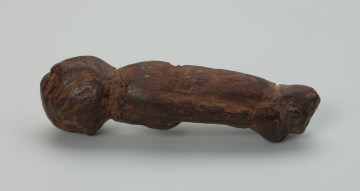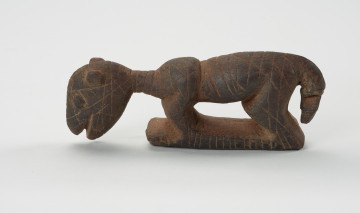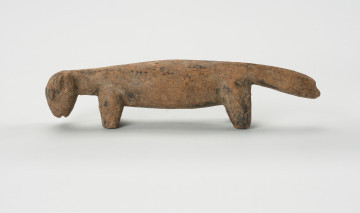
Zoomorphic figurine, Yurugu figurine
między 1951 — 2000
National Museum in Szczecin
Part of the collection: Collection of Dogonian art
Yurugu the animal is commonly called q jackal, although the correct name is a pale fox (Vulpes pallida). He is also a mythical figure, one of the first ancestors - the only one who was not born with a twin. Not only was his character imperfect, he also manifested a flawed nature. He committed serious offences that disrupted the order and harmony in the universe. Although in mythology and cosmogony he is a negative character, the Dogon believe him to be intelligent, and much more so than humans.Yurugu has been gifted with the gift of reading the future. There are many fables and stories that explain the origin of this ability. One of them was recorded by Denise Paulme, a distinguished French Africanist. One day, the Almighty and One God, ruler of all creatures, decided to see which of the animals was the cleverest. He decided to use a trick. He informed everybody of the death of his mother, although his mother was alive and well. The animals were very upset by this sad news and went to the master's house to pay their respects and express their condolences. The only animal that did not appear in the house of God was the jackal. He was wise and immediately recognised the deception. However, he was brought violently before the Lord, who demanded an explanation. Yurugu replied that he was sure that the mother of the Highest was alive. He also expressed contempt for the other animals who were so easily deceived. God liked this haughtiness and audacity of the jackal. He announced that it was he who had proved to be the wisest of all the animals. As a reward, he could ask for whatever he wanted. It was then that Yurugu claimed the ability to predict the future and show it to people. To this day, on the outskirts of villages you can see men bending over fortune-telling tablets and trying to read the traces left by the jackal to unravel the mysteries of the future.
Ewa Prądzyńska
Author / creator
Dimensions
cały obiekt: height: 3,9 cm, width: 2,4 cm
Object type
figure
Creation time / dating
Creation / finding place
Identification number
Location / status

między 1951 — 2000
National Museum in Szczecin

między 1951 — 1996
National Museum in Szczecin

między 1951 — 2000
National Museum in Szczecin
DISCOVER this TOPIC
National Museum in Szczecin
DISCOVER this PATH
Educational path